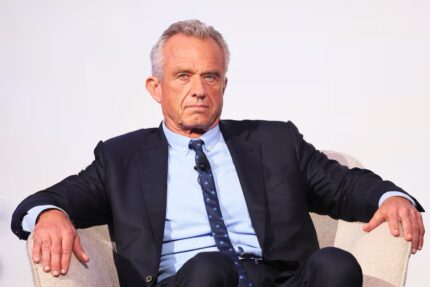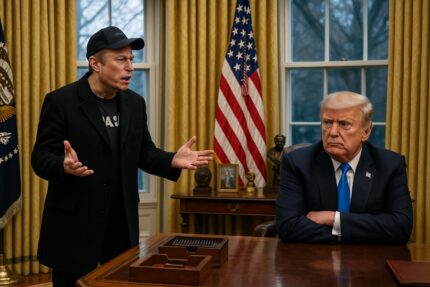In his first network interview since taking office, Health and Human Services Secretary Robert F. Kennedy Jr. offered clarity and sparked controversy on a host of pressing health issues, from the measles outbreak to obesity drugs, food dye bans, and sweeping budget cuts affecting public health services.
Robert F Kennedy Jr Shift on Measles Vaccine Amid Texas Outbreak Tragedy
In a striking departure from his past rhetoric, Robert F. Kennedy Jr. has for the first time publicly encouraged Americans to get the measles vaccine, acknowledging its proven efficacy. Speaking with CBS News chief medical correspondent Dr. Jon LaPook, Kennedy said, “The federal government’s position, my position, is that people should get the measles vaccine,” though he maintained that the government should not mandate it.
The new position comes in the wake of a deadly measles outbreak in West Texas, where more than 500 people have been infected and two unvaccinated children have died. Robert F Kennedy described his recent visit to the affected Mennonite community as “very heartbreaking.” He spent time with grieving families and attended funeral services for the two young girls. “It was very nice to be able to actually meet them in person… to get to know their community,” Kennedy said, calling them “resilient, God-fearing, resourceful and kind.”
The Centers for Disease Control and Prevention (CDC) has emphasized that nearly all infected individuals in the Texas outbreak were either unvaccinated or had unknown vaccination status. Kennedy’s newfound support for the vaccine may mark a critical moment in shifting public perception—especially among vaccine-hesitant communities.
Food Dyes Under Fire: A Push Toward Cleaner Ingredients
Robert F Kennedy also took aim at the food industry, advocating for the removal of harmful food additives, especially artificial dyes. In the interview, he labeled artificial dyes “the most egregious” ingredients in American foods and linked them to “a grim inventory” of diseases, including cancers, ADHD, and other neurological disorders.
Citing regulatory double standards, Robert F Kennedy pointed out that U.S. food companies already produce dye-free versions of their products for other countries like Canada and those in Europe, where such additives are either banned or strictly regulated. “In our country, it is rubber-stamped,” Kennedy argued, blaming the expansion of the GRAS (Generally Recognized As Safe) standard, which allows thousands of additives to bypass formal approval processes.
Kennedy said he’s working with companies like PepsiCo, which owns Doritos, to remove the dyes within two years. He also pledged to overhaul the GRAS standard itself, arguing, “The FDA became captured by the food industry,” leading to a vastly higher number of approved additives in U.S. products compared to Europe.
GLP-1 Drugs for Obesity: A Measured Path Forward
Robert F Kennedy addressed the growing debate over GLP-1 agonists—popular weight loss drugs like Ozempic and Wegovy—acknowledging their effectiveness but resisting immediate expansion of Medicare and Medicaid coverage for all individuals with obesity. Currently, the drugs are covered for those with diabetes or pre-diabetes.
“Over the long term, we’d like to see those drugs available after other interventions,” Kennedy said. He emphasized the importance of documenting attempts at lifestyle changes such as diet and exercise before qualifying for medication. “They can show that they’ve done these interventions, and if they don’t work, then you would be entitled to the drug.”
While the Biden administration proposed expanding Medicare coverage for obesity treatments, the Trump administration recently declined to proceed with that plan. Kennedy appeared to walk a middle line, signaling a willingness to eventually broaden access, while warning of the potential impact on medical costs.
Controversial Cuts to Public Health Programs
One of the most contentious parts of the interview came when Kennedy was questioned about massive budget cuts under his watch. Since taking office in February, Robert F Kennedy has overseen more than $11 billion in reductions affecting local and state public health programs, including those aimed at infectious disease response, mental health services, addiction treatment, and childhood vaccination campaigns.
Robert F Kennedy denied knowledge of approving the specific cuts, stating, “No, I’m not familiar with those cuts.” Despite that, the cuts have already led to thousands of federal employee layoffs and the dismantling of several key programs. Critics argue that these reductions come at a precarious time, with public health threats on the rise.
LaPook pressed Robert F Kennedy on the implications, citing concerns that gutting infrastructure now could leave the nation unprepared for future health crises. The HHS Secretary offered no specific plan to reverse the cuts but insisted he remains focused on reforms that eliminate inefficiencies and restore public trust in health systems.
Balancing Reform and Responsibility
Robert F Kennedy’s interview revealed a complex balancing act: advocating for transparency and reform while defending controversial policy decisions. Whether it’s his pivot on vaccine advocacy, push for cleaner food ingredients, or cautious approach to high-cost obesity drugs, Kennedy is presenting himself as a reformer tackling systemic issues—but not without backlash.
His tenure so far has drawn both praise and concern. Supporters welcome his emphasis on consumer safety and government accountability. Detractors warn that his budget cuts and regulatory shifts may weaken vital public health protections.
As Kennedy navigates his new role as the nation’s top health official, his actions and evolving stances are likely to continue sparking debate on what public health in America should look like in the years ahead.














